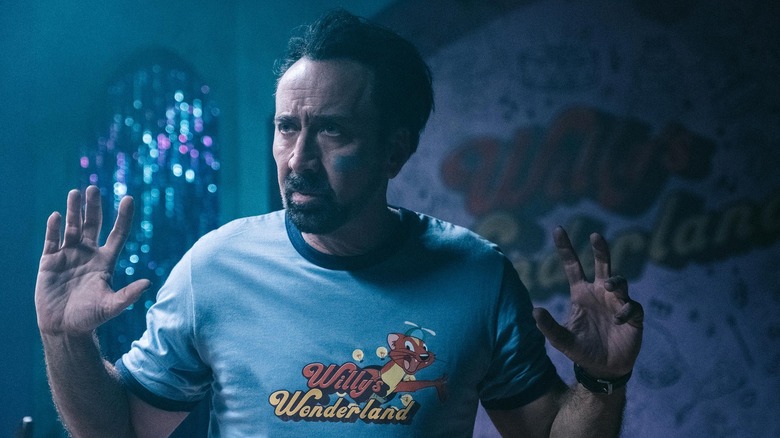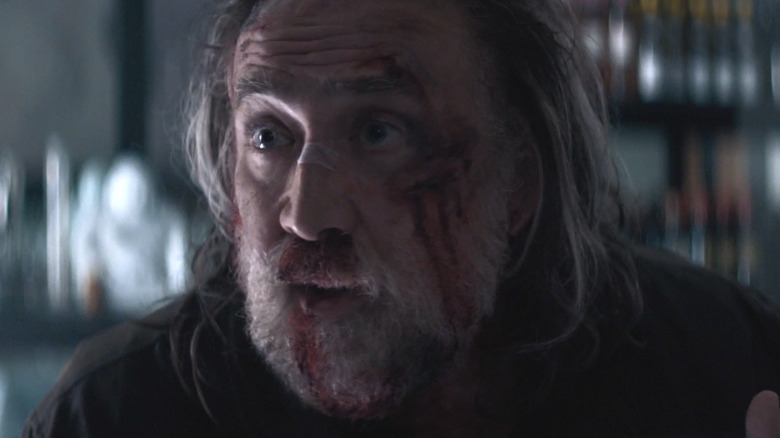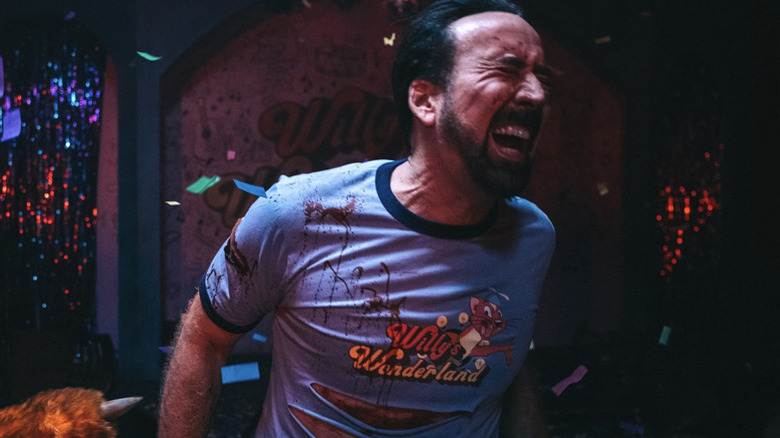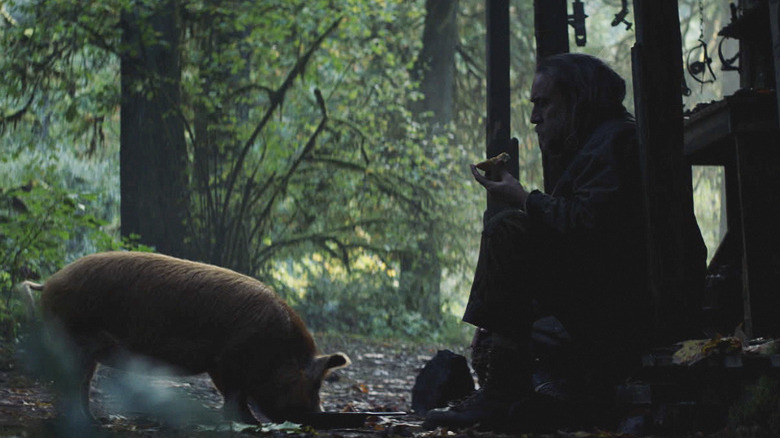The Two Nicolas Cages: A Case Study In How To Properly Utilize One Of Our Best Actors
The "memeification" of Nicolas Cage is a digital age phenomenon. Younger generations watch the Oscar-winning Coppola's catalog as "hilarious" YouTube compilation videos featuring titles like "Deadfall," "The Wicker Man," or "Vampire's Kiss." He's become infamous for his extravagant spending habits (he had to return a $276k dinosaur skull for legal reasons), which drives the online theory that he'll take any role for the right price to pay off castle-sized debts. Audiences demand the unrestrained Cage who can't control his character's emotions to thrive, howling lines like "TESTICLE!' with gusto, which — in my opinion — influences filmmakers to wrongfully indulge the viral tendencies of Nicolas Cage when there's so much more to the madman behind feral monologue screams.
To demonstrate my thesis, let's use two prominent 2021 examples. In "Willy's Wonderland," Cage battles animatronic Chuck E. Cheese knockoffs as a mute, energy-drink guzzling janitor. In "Pig," Cage emerges from woodland isolation to shake down the Portland restaurant scene, searching for his stolen and beloved truffle-hunting swine. One is a magnificent exploration of grief and love, the other a numb exploitation of the Cage who nabs internet clicks.
Pig
Oddly, the characters of Robin "Rob" Feld ("Pig") and "The Janitor" ("Willy's Wonderland") are foundationally comparable. They're rooted in a place of introspection and subtlety to allow Cage momentary eruptions of his trademark extremes. A film like "Mandy" understands this duality of Cage best: His characters must earn their snaps out of sanity or composure, and they're most powerful when there's been proper legwork to establish his cooler, subdued nature. "Willy's Wonderland" only comprehends the latter half of Cage's performative draw, heavy-handedly promoting the film's mechanical massacre while erasing Cage's unquestionable ability to first garner compassion for broken souls.
"Pig," alternatively, encourages Cage to excel at both the yin and the yang.
There's an exemplary scene in which Rob Feld interrogates his former prep cook Derrick Finway (David Knell), now the head chef of a haute cuisine, "familiar but foreign" Michelin wannabe restaurant called Eurydice. Derrick stammers about farm-to-table inventiveness, slowly unraveling before a grungy, scabbed Rob (who's fresh from an underground fight ring). This is the moment in other movies where Cage's antics might lead to a flipped table, or smashed bottle, or shouted profanities as Derrick confesses. In "Pig," director Michael Sarnoski knows better.
"This isn't real, you aren't real," Rob softly professes to the once hopeful owner of a village-favorite Irish pub. "We don't get a lot of things to really care about," Rob mutters, trying to connect with Derrick as tethered, wayward hearts. Cage's face is a pre-boil that's entirely more unsettling due to its resolute calmness. Escalation mounts through words, as an attentive Derrick wriggles and chugs his expensive red wine without an ounce of sophistication. It's not the time nor place for a loopable Nic Cage outburst, and Sarnoski's acknowledgment of the actor beyond overshadowing gifs is to his movie's benefit.
Willy's Wonderland
Meanwhile, "Willy's Wonderland" only sees Nicolas Cage as a one-dimensional source of entertainment. The anonymity of Cage's unnamed cleaner-upper is a gimmick meant to accentuate the action unfolding as plastic ball pits become slick with victim juices. Cage's personality traits are quirky for the sake of questionability, his seemingly superhuman violence the headliner attraction. How can you botch a scenario where Nicolas "Not The Bees" Cage goes apeshit on robotic weasels? Turns out the answer is "pretty simply," when you don't think past the initial amusement factor of your casting announcement.
There's nothing memorable about Cage's performance in "Willy's Wonderland" because he's there to fill a role the internet has deemed his bread-and-butter. The production offers no opportunity for Cage to imbue "The Janitor" with memorable traits. He pauses for breaks where he sips his fizzy Punch fuel, plays pinball, and then bashes some more monsters while teenagers die. Worse off, there's no dialogue for his character to utter. Nicolas Cage, the lunatic behind some of the most memorable on-screen tirades in the last two decades, is asked not to speak a single word, and instead just strolls through the movie like some kiddie-mascot Terminator. It's baffling — not only because Cage never has a chance to prove he's worth more than some algorithmic B-movie filler, but also because if you're only looking for "Crazy Cage," you've neutered his most maniac tendency. If you won't honor the density Cage brings to any role, whether unhinged or grounded, at least unleash the monster inside like his "Hokey Pokey" billiards breakdown in "Mom And Dad."
Learning the Right Lesson
What "Pig" accomplishes, and what should be rewarded by the Academy, is a Nicolas Cage that's forgotten by newer generations raised on the mythical "thespian" we — and Cage, in interviews — have shared across countless social media threads. He's not John Wick in this scenario, driving angry or Bangkoking dangerous. Rob Feld leaves a trail of humble sorrow wherever he goes and only escalates in the most dire, hopeless downfalls. The way Cage prepares a scrumptious meal for his foe or displays a photographic memory of every patron served is empathy that reverberates throughout an immaculately passionate experience. There are moments when Cage's kettle doth boil over, but it's only to capture the pinnacle of depression, loss, and exasperation. And even then the score might drown out Cage's words, leaving us with aching facial expressions that need no verbal translation.
"Willy's Wonderland" happens when star billing is valued over all else. Frankly, it's a curious predicament that forces one to wonder why Cage was even cast. Anyone can fulfill the bruiser arc of churning through enemies and slurping carbonated liquids — Nicolas Cage isn't "anyone." He's one of the most noteworthy performers working in today's cinematic industry, with a unique ability to pluck at one's emotions while losing himself to an otherworldly instability moments later. That's not to say he shouldn't be allowed to explore and redefine his "weirdness" through roles like "Between Worlds," or "Ghost Rider," and so on. It's more to suggest the highlight reels that garner internet fame have painted an incorrect picture of the Nicolas Cage some audiences might otherwise not recognize. That's how you get "Willy's Wonderland," a dull pummeler flick that doesn't utilize his voice, range, or even his darkest inhibitions in a movie that screams for even a glimpse of what he delivered in something like "Color Out Of Space."
"Pig," served course after course, embraces all sides of Cage. The sweetness of a head chef reconnecting with his former baker, the always-grieving widower who adores his partner piggy, the social outcast who scoffs at a system built on fakeness because that's what people want. In a way, "Pig" is Cage's direct response to the outcries for more of his "batshit" turns, emerging from behind countless riffs on his wildest sensibilities to remind Twitter avatars there's more to an award-winning actor than how a certain segment of audiences view him. "Pig" understands Nicolas Cage's fullest potential, coaxing a deeply complex culinary character from underneath leathery, bruised skin, proficient in highlighting his character dedication alongside the loudest, brashest accentuations. It's the total package, where something like "Willy's Wonderland" sells itself, and its actor, hundreds of yards short.
"Willy's Wonderland?" That's the type of Nicolas Cage role we've convinced ourselves we need. "Pig" is the type of Nicolas Cage role we deserve.



